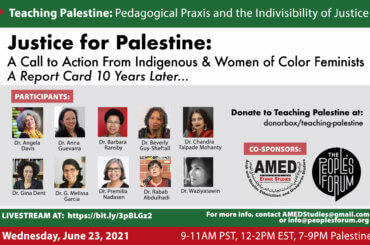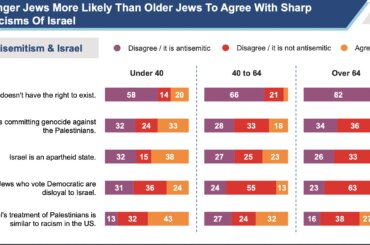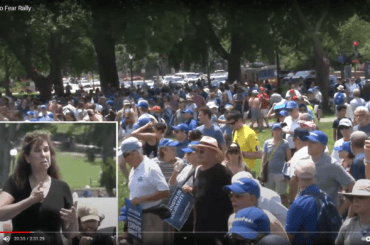Mainline church labels Israel an Apartheid state, and more churches are sure to follow

So much bad news is hitting Israel’s leaders, so fast, these days, that they may have overlooked warnings by the American Jewish Committee (AJC), among others, that the United Church of Christ General Synod was considering becoming the first major U.S. denomination to label Israel an apartheid state. The Zionist shock and outrage didn’t have the intensity of the meltdown over the Ben & Jerry’s Ice Cream affair, which came at the same time, but the UCC’s condemnation of Israeli treatment of the Palestinians is sure to resonate with the other mainline American churches — and their millions of members.
The UCC “A-bomb” simply said,
“We reject Israel’s apartheid system of laws and legal procedures,”
but it passed late in the day July 18 with an overwhelming 83% vote and was part of a long and unsparing indictment.
Moreover, the UCC resolution is likely to be only the first blow among many from other mainline denominations, including the Presbyterians, Methodists, Lutherans, Episcopalians, Unitarians, Quakers and others who will follow the UCC lead in denouncing Israel’s “continued oppression of the Palestinian people” and calling on the U.S. government to support full equal rights for Palestinians.
The UCC denounced almost all of the injuries done to the Palestinians over the decades, with the unstinting support of Washington. Thus, they:
- Affirmed the right of return to Palestine — or to compensation for property losses — of the 5.6 million Palestinian refugees registered with the UN Relief and Works Administration, invoking UN Resolution 194 (1948); rejected recent efforts to drastically narrow the refugee definition; and demanded full U.S. funding for UNRWA;
- Affirmed the constitutional right of Americans to protest Israel’s actions through BDS;
- Rejected “the idea that any criticism of policies of the State of Israel is inherently antisemitic” and opposed federal or state legislation to limit free speech on campuses or to constrain or punish BDS;
- Advocated “cessation of U.S. military aid to Israel” until Palestinian rights are “fully realized and protected”;
- Rejected any theology or ideology, particularly Christian Zionism, that “would privilege or exclude any one nation, race, culture, or religion”; and backed up the point with citations to pithy fundamental texts of the Jewish Bible and the New Testament;
- Condemned “Jewish-only settlements throughout the West Bank,” and the 2018 Nation-State basic law, while tying Israel to historical examples of “settler-colonialism” and to the pre-civil rights era racist regime known as Jim Crow;
- Faulted “provocative actions under the Trump administration, including moving the U.S. Embassy to Jerusalem,” and supporting Israel’s proposed illegal annexation of West Bank territory;
- Endorsed Palestinian Christian leaders’ landmark declaration of 2020 entitled “Cry for Hope: A Call for Decisive Action.”
Looking ahead, a manager of the UCC resolution drive, Rev. John Thomas of the UCC Palestine-Israel Network Steering Committee, said, “We hope that this provides some space for other denominations to follow our lead.” Both the huge vote for the resolution and the muted nature of the arguments opponents raised against it were encouraging, Thomas said. “Even delegates who argued against saying ‘apartheid’ seemed to understand that there is apartheid against the Palestinians but were afraid to name it. They clearly were intimidated by worries about the Jewish reaction.” Yet, the American Jewish Committee’s protests before and after the vote were strangely toothless. Rabbi Noam Marans, AJC Director of Interreligious and Intergroup Relations, mainly complained that the resolution should have mentioned “Israel’s relentless pursuit of peace for 73 years.”
The Episcopal Peace Fellowship Palestine-Israel Network (EPF-PIN), praised the UCC action as courageous, saying, “Standing as they did against attempts to soften and sidestep much needed truth-telling, the Synod members voted overwhelmingly to speak prophetically to the dire conditions facing the Palestinan people. By naming apartheid and calling it sin, the UCC has demonstrated that justice is love in action and has encouraged us and other Christian faith partners to continue the struggle.”
The moment of truth for supporters of the resolution came when they faced a procedural hitch in the process. The UCC committee charged with prepping the proposed resolution used its editing prerogative to soften the language, removing the term “apartheid” and a reference to Israel’s “sin.”
“Some folks wanted to maintain the initial language…, which offered an unambiguous prophetic vision,” the committee chair, Rev. Elliot Munn of Vermont said, as reported in a July 19 “UCC News” article. “Others were more cautious about how particular words would affect their interfaith friends and colleagues.” Rev. Jeff Lukens of Southern New England said, “Toning down the inflammatory use of the word apartheid will help us to speak to the truth of what is happening and allow us to continue to be faithful in our interfaith work.”

Lukens was countered successfully by Rev. David Grishaw-Jones, who said, “Apartheid is an internationally defined and recognized term used in legal systems and international diplomacy to name situations like the current one in Palestine and Israel. The word is profoundly important to our covenant partners in Palestine and Israel, who struggle against the yoke of occupation and oppression every day.”
A “large majority” of the Synod then put the word apartheid back in the resolution, Thomas said.
As for why it was necessary to say Israel’s conduct is a sin, Rev. Shari Prestemon of Minnesota explained, “What we speak of is not just a geopolitical matter. … The systemic oppression and denial of human and civil rights for Palestinians caused by the policies of the State of Israel violate the vision of just relationships set forth by ancient [Hebrew] prophets and the [Christian] gospels. They can rightly be described as a sin against God and God’s children.”
Citing the massive support extended to Israel by the U.S. government, “UCC Leadership” said in a July 19 statement that “as U.S. citizens and as a U.S church,” the UCC has “a special responsibility to speak out on this.” They acknowledged that the resolution would “cause discomfort” for some but insisted that they desired continued dialogue. However, it seems clear that the time for endless dialogue with no action on the part of Israel is running short.
Mondoweiss covers the full picture of the struggle for justice in Palestine. And for the next 10 days, every dollar you give will be doubled, up to $50,000, to support our unique journalism. Read by tens of thousands of people each month, our truth-telling journalism is an essential counterweight to the propaganda that passes for news in mainstream and legacy media.
Our news and analysis is available to everyone – which is why we need your support. Please contribute so that we can continue to raise the voices of those who advocate for the rights of Palestinians to live in dignity and peace.
Palestinians today are struggling for their lives as mainstream media turns away. Please support journalism that amplifies the urgent voices calling for freedom and justice in Palestine.









Geen opmerkingen:
Een reactie posten